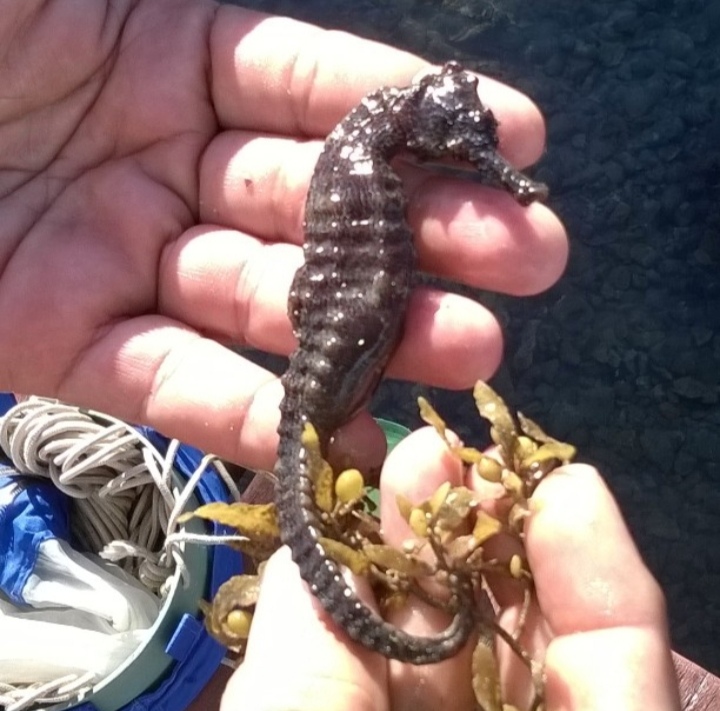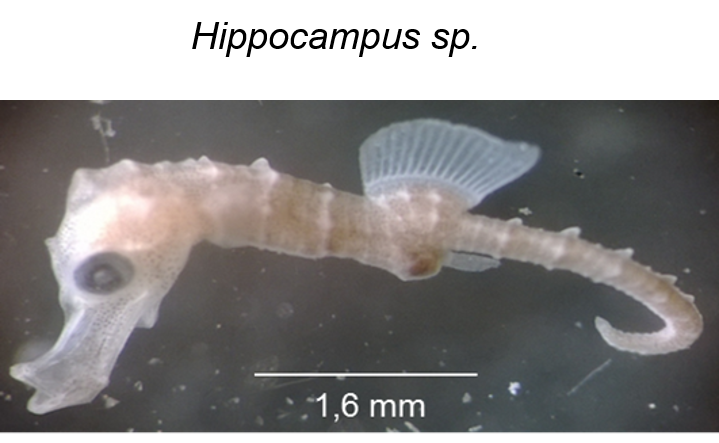Hippocampus hippocampus, el gran monstruo marino. by @trinima

Hello friends of hive, today I want to share with you a little bit of biological knowledge and the experience I had with such a wonderful character, out of a fantasy story and I will present it to you through a photograph of a few years ago, which I took in the turpialito inlet, Sucre state, Venezuela.
Pará mí el día empezó como todos los demas; despertarme y en un instante arreglarme para ir a la UDO y agregarle a ese día, realizar muestreos para el laboratorio donde laboraba, y por azares del destino, encontré mi personaje fantástico en la orilla del mar, agarrado de un alga marina para ayudarse a luchar contra la corriente , me sentía emocionada, ya que, era la primera vez que veía un Hippocampus (caballito de mar), y que podía tocarlo con mis manos. Allí fue donde decidí capturar el momento para tener un recuerdo de ese día.
For me the day began like all the others; I woke up and in an instant I got ready to go to the UDO and add to that day, sampling for the laboratory where I worked, and by chance, I found my fantastic character on the seashore, clutching a seaweed to help him fight against the current, I was excited, because it was the first time I saw a Hippocampus (seahorse), and I could touch it with my hands. That's where I decided to capture the moment to have a memory of that day.
La segunda vez que tuve la oportunidad de ver otro caballito de mar fue como fase larval, capturado en un muestreo de ictioplancton mediante redes de plancton en la laguna de Chacopata; estado Sucre, Venezuela. Pará mi como Bióloga ha sido una experiencia gratificante haber tenido este primer contacto directamente con la naturaleza y especialmente con este tipo de pez no tan común al cual pude ayudar a prolongar su vida; puedo imaginarlo surcando las furias aguas de los mares.
The second time I had the opportunity to see another seahorse was as a larval stage, captured in a sampling of ichthyoplankton using plankton nets in the Chacopata lagoon; Sucre state, Venezuela. For me as a biologist it has been a gratifying experience to have had this first direct contact with nature and especially with this not so common type of fish which I was able to help prolong its life; I can imagine it furrowing the furious waters of the seas.

Estos organismos pertenecen a la familia Syngnathidae, presentan el cuerpo y cola cubiertos por anillos óseos articulados. Nadan muy lentamente por ondulación o vibración de las aletas dorsal y pectoral. Tienen coloraciones muy variadas, del tipo de semejanza protectiva, de manera que habitualmente se mimetizan con el sustrato sobre el que viven. (Cervigon, 1991).
These organisms belong to the Syngnathidae family, and their bodies and tails are covered by articulated bony rings. They swim very slowly by undulation or vibration of the dorsal and pectoral fins. They have very varied colorations, of the protective resemblance type, so that they usually mimic the substrate on which they live. (Cervigon, 1991).
El caballito de mar es uno de los peces más amenazados de todo el planeta. Envueltos por un magma de mitología, su origen data de hace 40 millones de años. En el Mediterráneo hay dos especies: el Hippocampus hippocampus y el Hippocampus guttulatus. Verlos en libertad es muy difícil. Pocos submarinistas en el Mediterráneo han podido captar imágenes de ellos. Y los que lo han hecho, han esperado días (o incluso semanas) esperando a que salieran de sus escondrijos a grandes profundidades. "Son peces que de cada vez han ido a menos, en gran parte por la destrucción de posidonia del Mediterráneo, su hábitat", explica Marta Carreras, científica de la fundación medioambiental Oceana. fuente
The seahorse is one of the most endangered fish on the planet. Enveloped by a magma of mythology, its origin dates back 40 million years. In the Mediterranean there are two species: the Hippocampus hippocampus and the Hippocampus guttulatus. Seeing them in the wild is very difficult. Few divers in the Mediterranean have been able to capture images of them. And those who have, have waited days (or even weeks) waiting for them to emerge from their hiding places at great depths. "They are fish that have become less and less abundant, largely due to the destruction of posidonia in the Mediterranean, their habitat," explains Marta Carreras, a scientist with the environmental foundation Oceana. fuente
Como dato curioso, el caballito de mar es considerarlo en la cultura celta como vínculos importantes con las otras dimensiones o mundos; y en Europa, en la época griega y romana, se creía que llevaba las almas de los marineros fallecidos al purgatorio. 🤪😜😁
As a curious fact, the seahorse is considered in Celtic culture as important links to the other dimensions or worlds; and in Europe, in Greek and Roman times, it was believed to carry the souls of deceased sailors to purgatory. 🤪😜😁
Espero tengan la oportunidad de ver un Caballito de mar y sientan la misma emoción y grata experiencia.
I hope you have the opportunity to see a seahorse and feel the same emotion and pleasant experience.
Cervigon, F. 1991. Los peces marinos de Venezuela. Vol. I. 2da ed. Fundación científica Los Roques. Cromotip, Caracas, Venezuela.
Cervigon, F. 1991. Marine fishes of Venezuela. Vol. I. 2nd ed. Fundación científica Los Roques. Cromotip, Caracas, Venezuela.
Las imágenes que no están previamente identificadas son de mi propiedad, han sido capturadas con mi HUAWEI Y7 2019.
Images that are not previously identified are my property, they have been captured with my HUAWEI Y7 2019.

Congratulations @trinima! You have completed the following achievement on the Hive blockchain and have been rewarded with new badge(s):
Your next target is to reach 200 upvotes.
Your next payout target is 50 HP.
The unit is Hive Power equivalent because post and comment rewards can be split into HP and HBD
You can view your badges on your board and compare yourself to others in the Ranking
If you no longer want to receive notifications, reply to this comment with the word
STOPCheck out the last post from @hivebuzz:
Support the HiveBuzz project. Vote for our proposal!